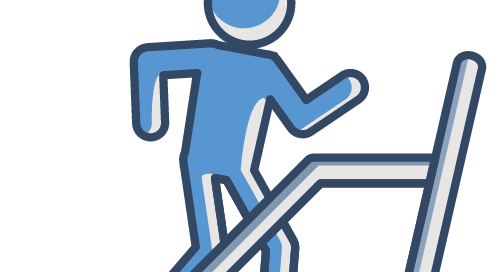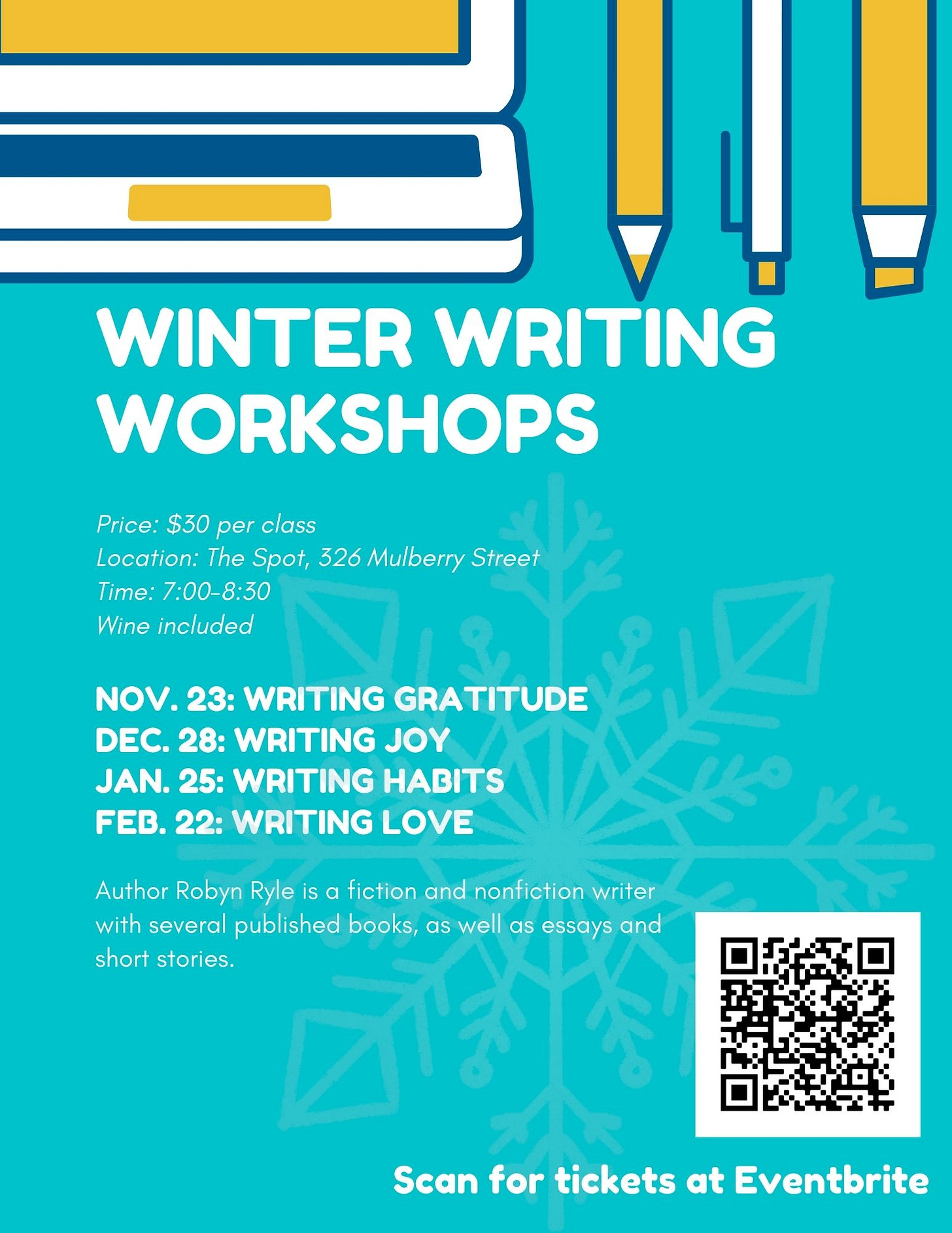Thinking about the hedonistic treadmill
As you develop tolerance to success and joy, it takes bigger and bigger hits of it to feel the effects. The successes that once brought you joy feel humdrum.
This week I walked down to the library to pick up some books, one of my favorite activities ever. When the library re-opened after being shutdown during the pandemic, I practically skipped down the street to get there, I was so happy.
As I looked in the front windows at the magazine racks, I flashed back to a memory from a few years ago. Ten years, actually—during my very first sabbatical, when I decided I was going back to writing again after a long break. The library had a subscription to Writer’s Digest and I would go to the library, sit in one of the chairs by that window, and thumb through the pages, looking for literary magazines and writing contests to enter. This was the same time that the 605 Grille was open for breakfast and lunch, so I’d head down there early with my computer to sit at the bar with a cappuccino and some Greek yogurt with honey and walnuts. And I’d write. When I look back, it’s one of the happiest times of my life. It was about that same time I decided I should try to write a novel.
I’ve wanted to be a writer for as long as I can remember and I was sending stories out to places like Seventeen in high school, secretly and quietly. Packed away in the bottom of one of our closets, there’s a thick stack of rejections from literary magazines that I racked up in college when I was sending out stories intensely. This was when “sending” meant actual, physical mail. Then came graduate school and full-time teaching and the writing fell away.
Then around 2010, I started my blog and writing stories again and I decided to give this whole writing thing another go. Why not? If I could write a textbook, I could write a novel, right?
What I remembered as I passed the library window was the way I felt back then—so, so excited. There was the excitement of reading the new issue of Writer’s Digest and maybe finding a new place to send a story. The excitement of going to my first writer’s conference. The excitement of getting my first publication, a dream that I’d nursed for 20 years. The excitement of being a writer, doing writer-ish things, like sitting in a restaurant with a cappuccino and, you know, writing! Is there anything cooler or more satisfying than writing in restaurants and bars and parks and coffee shops? No, there is not.
Every new hurdle I crossed came with a sweet bubbling of satisfaction and delight. Getting an acceptance for my first piece of flash. Getting a personal rejection from one of my dream journals.1 Starting my first novel. Publishing a chapbook with the amazing Leesa Cross-Smith. Finishing my first novel! Getting accepted to go to a Tin House writer’s workshop. Sending out my first query letter to an agent. Getting a request for a full from an agent! Getting an agent, sending my book out to editors, and getting a book deal!
When I write it all out, I can’t believe I did all of that. I got not just one book deal, but two. Two books—three if you count my sociology of gender textbook. Publishing three books, I have to remind myself very often, is not an easy thing. One survey found that 80 percent of Americans believe they have a book in them. That’s 280 million people, but only about 300,000 books are traditionally published each year. Even if you go with the total number of books published (including self-published) the yearly number is 2 million, which means of those 280 million people who think they have a book in them, only one in 140 million actually publish it.
None of this is to brag, but just to point out to myself that this is a rare thing. The sort of thing you should definitely continue to be excited about, right? The kind of thing that should give you a little thrill of delight every time you think of it.
Does it, though? Nope. Instead of thinking about how incredible an accomplishment publishing three books is, I focus on how well the books sold or didn’t. I think about the review I read, that wasn’t even really a bad review as much as being about their disappointment that the book didn’t exactly reflect this person’s experiences.2 Instead of thinking about how far I’ve come, I focus on the fact that I’m back to trying to find an agent, in the query trenches yet again. I got tattoos on my arm to remind myself of how amazing it is to have published three books, but even that didn’t work.
I knew that publishing a book wouldn’t make me happy, just like winning the lottery doesn’t really make people happy. There’s a name for this phenomenon—the hedonic treadmill or hedonic adaptation. Something amazingly good (or amazingly bad) happens to you. For a while, you’re much happier (or sadder). But after a while, you return to your base level of happiness (or sadness).
If you buy the hedonic treadmill theory, what happens is that as a person makes more money (or accomplishes successively more difficult and important writing goals), their expectations and desires rise in tandem. At first, I was really excited just to get a story published. But then it wasn’t enough to get a story published, I had to get it published in a “prestigious” journal. And then, who cares about publishing stories, I needed to get an agent. And then not just a book, but a book with a big advance. And on and on and on. It’s a bit like addiction, in that you develop tolerance to success so that it takes bigger and bigger hits of it to feel the effects. The successes that once brought you joy feel humdrum.
This is the place in the newsletter where I tell you how to overcome the hedonic treadmill or how I overcame it. This is the tidy wrap-up, only I’m not sure what that tidy wrap-up is. The hedonic treadmill isn’t easy to escape and it’s not all bad. It applies to bad things as much as good things. People who are paralyzed return to their base levels of happiness, too.
The feeling I had, looking in the library window—that was nostalgia. That time in my life looked perfect and happy in hindsight. But I guarantee you that in the moment, it didn’t feel that way at all. Don’t get me wrong—sabbaticals are definitely happy-making. So much so, that everyone should have them. But at this point in my life, I have figured out that so many events and situations that were stressful or uncomfortable in the moment look so much lovelier with the fuzzy distance of time. Hell, I’ve felt nostalgic at various points for those first days of the pandemic and we all know that was horrible. Nostalgia teaches us that the things we look back on were better than we thought they were in the moment, which is a good lesson to carry into the present. What feels like a rough patch might also be the best time of your life!
The hedonistic treadmill also reinforces the lesson we all know but that’s so hard to internalize—in the end, happiness has to come from inside, not from any external source. Your children, the love of your life, the new job, the new town, the book deal—none of those things can really make us happy because the only thing that can really make us happy is us. Ourselves. Simple, right? But one of those lessons that is the work of a lifetime. Or maybe other people master it more quickly, but at 47, I’m still working my ass off on it. And getting better, day by day and step by tiny step.
Hey, we’re 14 new subscribers away from 100 and this is my 49th newsletter! It’d be amazing to reach 100 for the big 50th newsletter, so please share widely and comment! I love hearing from everyone!
Spots are filling up in the first of my winter writer workshop series on Tuesday, November 23. Sign up here and use the promo code (YOUTHINKFALL21) to get $5 off your first workshop.
Thanks as always for reading!
A personal rejection is a big deal for writer’s all-around—from the editor of literary magazine or an agent or whoever, really. It means the person took the time to say no, sometimes even explaining why they said no. Different writers feel differently, but I’m always happy to get a personal rejection. Along these lines, I once got a personal rejection from the Roxane Gay, back when she edited her literary magazine, PANK, on Christmas Eve. It was pretty nice as far as Christmas presents go.
I think all negative book reviews are variations on this theme—this book was not the book I wanted or needed it to be. Which, fine, but also a little part of me wants to say, then you do it! Write the damn book you want or need!






I relate to this 200%. Or more. Because I often feel as if I’m an onion. Many layers, all those past selves who were variously happy, sad, frustrated, elated: all still there. And the surface layer struggling to put things in perspective… needed this.